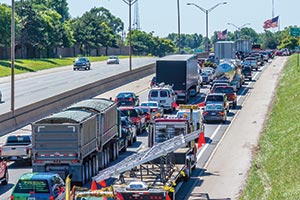Traffic Costs Industry $49.6 Billion During 2014, ATRI Study Shows

This story appears in the April 25 print edition of Transport Topics.
Traffic congestion on the nation’s highways added more than $49.6 billion in operational costs for the trucking industry in 2014, according to a study released April 19 by the American Transportation Research Institute.
ATRI’s analysis showed that trucks were delayed for more than 728 million hours, or 264,500 drivers sitting idle for a working year. ATRI’s previous study covered about 50,000 miles of interstate highways. This one added state highways, bumping the total to about 200,000 miles. But while the mileage quadrupled, the costs increased more than eightfold.
“That’s a huge number,” ATRI Vice President Dan Murray said. “I didn’t expect it to jump so exponentially.”
More than a dozen states experienced congestion costs of more than $1 billion, with Florida and Texas each exceeding $4 billion. According to ATRI, 89% of the congestion on the interstate system happened on just 12% of the roads. Those figures are 88% and 18% when roads other than interstates are included.
“The FAST Act essentially said to apply resources to freight bottlenecks and impediments, and we’ve now given [governments] strategic targets of where and how to do that,” Murray said, referring to the five-year federal transportation funding plan that became law in December. “I think this is going to be a powerful tool for a lot of transportation planners and decision-makers who have to go the state legislatures and Congress and say, ‘This is far more costly than you thought. Please raise fuel taxes.’ The political agendas have been trumping the economic realities.”
Per ATRI’s annual list of bottlenecks, 95% of the delays occurred on highways in metropolitan areas. On a per-truck basis, trucks that travel 150,000 miles annually averaged a congestion cost of $26,625.
“In light of new findings from the American Transportation Research Institute that congestion costs the trucking industry nearly $50 billion each year, it is incumbent on transportation agencies to address major highway freight bottlenecks,” said Darrin Roth, vice president for highway policy for American Trucking Associations. “We believe that establishment of strong performance metrics can help to ensure that the money the industry contributes is invested wisely.”
Also last week, the Federal Highway Administration proposed a rule that outlines new performance measures for states to assess congestion and freight movements.
The proposal will require states to collect data on actual travel times and to monitor the performance of highways. States will have to establish performance targets and report on progress, which, FHWA said, will help them make better investment decisions and ensure more predictable commutes.
“When busy travelers head out on the road to get to their jobs, pick up a child at school or go to a doctor’s appointment, they allow sufficient time for travel and, as a result, expect to be there on time,” FHWA Administrator Gregory Nadeau wrote on the Department of Transportation’s website. “Freight shippers have the same expectation when they estimate how much time it takes to deliver their products, often perishable goods. If travelers and shippers can’t predict how long a trip might take, they have to build extra time into their schedules.”
Nadeau added that the proposed rule addresses the concerns outlined in DOT’s “Beyond Traffic” report, which looks at the nation’s transportation system over the next three decades and projects freight volumes will increase by 45%.

